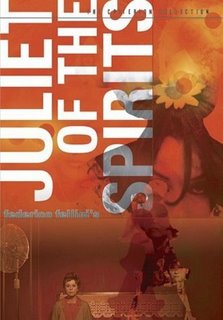
Giulietta Masina married Frederico Fellini near the end of the Second World War and remained in that interesting social compact (unconventionally) for fifty years, at which point Fellini died; Masina died five months later. Giulietta degli Spiriti/Juliet of the Spirits (1965) takes an indirect look at their relationship near its halfway point, or so it would seem. As one character states in the movie: "The interpretation is up to you. What can we say?"
Masina plays Giulietta/Juliet, a mostly self-contained middle-aged woman with a strong Catholic background; when confronted with her husband's infidelity, she falls through a metaphorical rabbit hole. This is Fellini's first color movie, and all its heightened effects work together to radiate a world of the spirits. Colors are wild and vivid; sounds echo; the camera moves and all is in motion. The sharp images, incandescent hues and frequent use of shadow create a dreamy, sometimes hallucinatory feel for Giulietta's derangement of the senses. The characters are, well,
Felliniesque . . . Diane Arbus in color. It's a luxurious and unrushed ride.
What I see immediately after viewing Juliet of the Spirits are a series of artistic "hyperlinks" to other movies: back through time to The Wizard of Oz and Fritz Lang; over the rainbow to Ingmar Bergman's The Seventh Seal; and coming our way through such visually stunning films made between 1965 and 1986 as Rosemary's Baby, Barbarella, The Exorcist, Aguirre: The Wrath of God, Carrie, The Shining, Stardust Memories, and Blue Velvet; and even closer, to the great HBO series of recent years. Interesting company, indeed; with, however, almost no violence at all in Juliet of the Spirits. The music at times reminds me of Woody Allen, for sure; the Italian dialogue is beautiful to listen to, even while keeping up with the subtitles.
To me, the coolest thing in the movie is the furiously fluttering artificial fire that surrounds Juliet as she is being (pretend) burned to death in her childhood school play rendition of a Catholic martyr, a striking image that visits her from time to time.
Today's Rune: Harvest.









2 comments:
I like that title quite a lot. I have not seen the movie, though.
One of my favorites by Fellini, very much in the vein of what the French call the "fantastique", in which fantasy elements intrude on an otherwise realistic scenario. And I always love Guillietta's performances in her husband's films.
Post a Comment